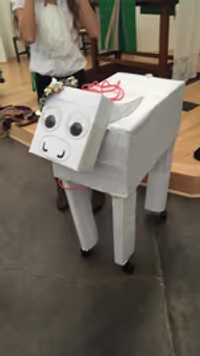Workshop
Hestia2
Swing Joined: 12/6/24
#2Workshop
Posted: 2/6/25 at 2:45pm
If you don't have an agent, that's your first step. Nobody will give you the time of day without an agent. If you're a relatively new or unproduced playwright, ignore the top agencies (WME, CAA, UTA, ICM, etc) and focus on scrappier agencies.
If you cannot get an agent to represent you, it might be indicative that your play is not worth producing. Or maybe not!
Once signing with an agent, the agent will help you develop a plan. Maybe they'll want to package it with a director first, maybe not. They'll pitch it around to relevant theatres in New York and regionally. If one of them says yes to workshopping, it could take a year or more for that to actually happen.
If that process gets no bites, it might be indicative that your play is not worth producing. Or maybe not!
Another option if the play gets no bits from your agent: Secure funding independently (usually in the $100K to $500K range) and either hire a New York-based general manager/producer to workshop the play, or have your agent return to the regional theatres with that "enhancement" money attached. Money talks and plenty of good and bad plays have been produced simply because the writer has access to money.
All that will put you one step closer to getting a full production of your play after it is workshopped.
Good luck!
#3Workshop
Posted: 2/6/25 at 4:08pm
ErmengardeStopSniveling said: "If you don't have an agent, that's your first step. Nobody will give you the time of day without an agent. If you're a relatively new or unproduced playwright, ignore the top agencies (WME, CAA, UTA, ICM, etc) and focus on scrappier agencies.
...
Once signing with an agent, the agent will help you develop a plan. Maybe they'll want to package it with a director first, maybe not. They'llpitch it around to relevant theatres in New York and regionally. If one of them says yes to workshopping, it could take a year or more for that to actually happen."
Oh, this is fascinating. As a person who doesn't know anything about producing, I always assumed you first have to have your works performed to get representation? As in "you can bring in the money so we shall be your agent".
Does it work the same with musicals considering there's more aspects to consider and it's often written by more people? Or would the work itself rather than its various authors be represented by a literary agent?
GottaGetAGimmick420
Broadway Star Joined: 12/9/23
#5Workshop
Posted: 2/6/25 at 5:23pm
TimeToDither said: "Oh, this is fascinating. As a person who doesn't know anything about producing, I always assumed you first have to have your works performed to get representation? As in "you can bring in the money so we shall be your agent".
Does it work the same with musicals considering there's more aspects to consider and it's often written by more people? Or would the work itself rather than its various authors be represented by a literary agent?"
I mean, if the person has ZERO track record it would be tough to gain traction. Even productions at an amateur or college theatre are better than zero produced productions.
For musicals, it can vary and there's no one way to go about it. Sometimes authors are represented by the same agent, and the agent treats everything as a package, but often there are different agents involved.
Alex Kulak2
Broadway Legend Joined: 9/11/16
#6Workshop
Posted: 2/6/25 at 5:34pm
ErmengardeStopSniveling said: "If you don't have an agent, that's your first step. Nobody will give you the time of day without an agent. If you're a relatively new or unproduced playwright, ignore the top agencies (WME, CAA, UTA, ICM, etc) and focus on scrappier agencies."
I've actually been looking for an agent (I've written 7 full length plays and am currently writing a musical). Do you have any examples of scrappier agencies? The ones I've looked at only represent actors.
JSquared2
Broadway Legend Joined: 3/23/17
#7Workshop
Posted: 2/6/25 at 5:56pm
Alex Kulak2 said: "ErmengardeStopSniveling said: "If you don't have an agent, that's your first step. Nobody will give you the time of day without an agent. If you're a relatively new or unproduced playwright, ignore the top agencies (WME, CAA, UTA, ICM, etc) and focus on scrappier agencies."
I've actually been looking for an agent (I've written 7 full length plays and am currently writing a musical). Do you have any examples of scrappier agencies? The ones I've looked at only represent actors."
A simple Google search of "Theatrical Literary Agencies" will take you here:
https://www.dramatistsguild.com/taxonomy/term/297
You're going to have to do a lot of the legwork yourself -- no matter which path you choose.
#8Workshop
Posted: 2/6/25 at 6:05pm
Honestly, I would start with writer’s groups, playwriting courses, or open call play development programs before even thinking about representation or professional development.
#9Workshop
Posted: 2/6/25 at 6:14pm
ErmengardeStopSniveling said: "If you don't have an agent, that's your first step. Nobody will give you the time of day without an agent. If you're a relatively new or unproduced playwright, ignore the top agencies (WME, CAA, UTA, ICM, etc) and focus on scrappier agencies.
If you cannot get an agent to represent you, it might be indicative that your play is not worth producing. Or maybe not!
Once signing with an agent, the agent will help you develop a plan. Maybe they'll want to package it with a director first, maybe not. They'llpitch it around to relevant theatres in New York and regionally. If one of them says yes to workshopping, it could take a year or more for that to actually happen.
If that process gets no bites, it might be indicative that your play is not worth producing. Or maybe not!
Another option if the play gets no bits from your agent:Secure funding independently (usually in the $100K to $500K range) and either hire a New York-based general manager/producer to workshop the play, or have your agent return to the regional theatreswith that "enhancement" money attached. Money talks and plenty of good and bad plays have been produced simply because the writer has access to money.
All that will put you one step closer to getting a full production of your play after it is workshopped.
Good luck!"
ICM no longer exists.
#10Workshop
Posted: 2/6/25 at 6:24pm
I may be able to give some advice here: I've had a show Off-Broadway and am expecting to have another next year, but I'm very much from the DIY scene by necessity. I suspect you are too; while I've had a FEW extra connections and opportunities because of my very brief Off-Broadway run in 2016, most of what I say here is going to apply to you too.
First: if your intention is to go from your laptop to a prestigious New York or regional stage, it will never happen. You could be the next Shakespeare or the next Sondheim, it will still not happen. The quality of your work is inconsequential when you aren't either famous, wealthy or already successful. At this early stage in the game, take the help you can get; you'll need it and grow from it. When it comes to developing a new show from scratch, I have three big pieces of advice. Don't be in New York. Don't be too proud. And be punk rock.
Don't be in New York: major and important shows always seem to come up through New York, but a new show by a passionate nobody is not a major or important show (at least, not yet). You could raise tons of money and try to workshop your show there, but the smartest thing you can do is to take your show and work on it elsewhere, with non-Equity performers and lower costs for space and time.
Don't be too proud: some people will tell you that if your show doesn't premiere at a reputable space with lots of press coverage, it's doomed not to go anywhere from there. Sometimes that's true, but sometimes it's not. Waiting for perfect means waiting for nothing, more often than not. Instead, get involved in your local theatre community; try to be a recognized presence and well-known, well-liked person both at your local major city's professional scene and at the smaller regional and community theatres near you. If you're lucky, these spaces are more likely to take a chance on workshopping your show or even producing it. It won't be Broadway, but it's better for a thing to BE, than to be PERFECT.
Be punk rock: if you've got friends and collaborators, self-producing can sometimes be the best workshop you can get. Call in favors, rent a hall, rehearse in living rooms or the rec room at your local public library. Do the show as a staged reading with zero production value other than borrowed props and wardrobe costuming: you're just testing the MATERIAL and how it plays with an audience and on its feet. Like the DIY punk scene, where musicians got used to taking the whole touring rig out of a van, throwing it up onstage, doing their thing, then putting it all back in the van, THAT is how you want your DIY show to go. And if there's something in the material you've written that is too elaborate or demanding to be done on a shoestring without production values? That right there is a stumbling block you've identified. Anything written simple can be done big, but some things are written too big to be done simple. Don't spend more than $500 on this; call it the cost of a pair of semi-fancy shoes or a new PS5, a single slightly expensive luxury that won't break the bank.
This isn't a blueprint for success or a one-size-fits-all, but I'm speaking from someone who made this work: it is better to do the thing, than to endlessly TRY to do the thing.
Videos





